 Petzlover
Petzlover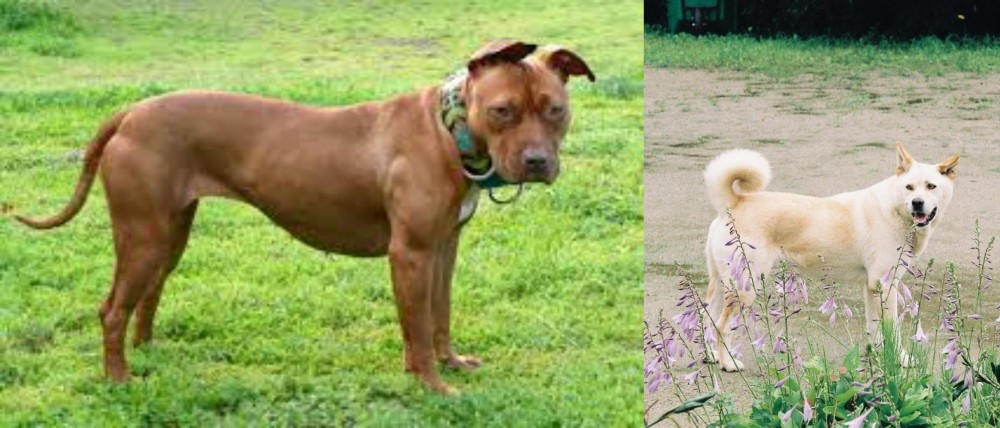 American Pit Bull Terrier is originated from United States but Pungsan Dog is originated from North Korea. Both American Pit Bull Terrier and Pungsan Dog are having almost same height. American Pit Bull Terrier may weigh 6 kg / 14 pounds more than Pungsan Dog. Both American Pit Bull Terrier and Pungsan Dog has same life span. American Pit Bull Terrier may have more litter size than Pungsan Dog. American Pit Bull Terrier requires Low Maintenance. But Pungsan Dog requires Moderate Maintenance
American Pit Bull Terrier is originated from United States but Pungsan Dog is originated from North Korea. Both American Pit Bull Terrier and Pungsan Dog are having almost same height. American Pit Bull Terrier may weigh 6 kg / 14 pounds more than Pungsan Dog. Both American Pit Bull Terrier and Pungsan Dog has same life span. American Pit Bull Terrier may have more litter size than Pungsan Dog. American Pit Bull Terrier requires Low Maintenance. But Pungsan Dog requires Moderate Maintenance
 The history of the American Pit Bull Terrier might be a confusing one to some dog lovers and certainly to the general public that tends to lump all the “bully” breeds into a category called “pit bull”. This is because of the negative reputation this group of breeds has acquired over the past 30-50 years due to misuse and mis-breeding by the dog fighting industry. This categorization includes the American Pit Bull Terrier, The American Staffordshire Terrier, the Bull Terrier and the Staffordshire Bull Terrier.
The history of the American Pit Bull Terrier might be a confusing one to some dog lovers and certainly to the general public that tends to lump all the “bully” breeds into a category called “pit bull”. This is because of the negative reputation this group of breeds has acquired over the past 30-50 years due to misuse and mis-breeding by the dog fighting industry. This categorization includes the American Pit Bull Terrier, The American Staffordshire Terrier, the Bull Terrier and the Staffordshire Bull Terrier.
There is major confusion and disagreement on the difference between the American Pit Bull Terrier and the American Staffordshire Terrier. The AKC does not recognize the American Pit Bull Terrier as a separate breed, but its founder and the UKC, ADBA do so. In the 1930’s the American Pit Bull Terrier was a recognized breed and in response to the negativity of pit-fighting, they renamed it as the American Staffordshire Terrier.
The American Pit Bull Terrier was developed to be a little larger in size than the Staffordshire in both height and weight. This breed comes from crossing various Bull and Terrier breed to get a working dog. The Amstaff for the most part is bred to be a show dog and is not usually a “street dog” used in dog fighting rings. The direct ancestors of the APBT are the Old English Bulldogs and the Old English Terriers. These dogs are great family dogs, gentle beyond comparison unless raised to fight. They make great therapy dogs as well as police dogs. They are not by nature cruel, aggressive or attack dogs.
Both professional confirmation breeders and street fight breeds have developed new strains of the American Pit Bull Terrier. A few are worth mentioning here.
One of the oldest strains of the American Pit Bull Terrier they are red in color and that red is a very unique tone. They have a copper colored coat and nose with red nails, red lips and amber or red eyes. These dogs were originally from Ireland and when they came to America they had the red nose. Originally bred for gameness, it is the red color that is sought after now.
These are another old breed, but they have black noses and were initially bred by John P. Colby in the late 1800s. These dogs were known to be indominable fighting dogs and were bred into almost every line of American Pit Bull Terriers that exist today. The line is still maintained by the Colby family.
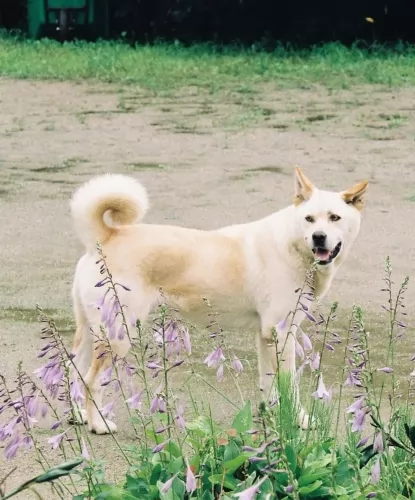 It is a hunting dog and considered to be a National Treasure of Korea. It was during the Japanese occupation of Korea that the dog’s thick coat was sought after for use in fur coats for the Japanese military.
It is a hunting dog and considered to be a National Treasure of Korea. It was during the Japanese occupation of Korea that the dog’s thick coat was sought after for use in fur coats for the Japanese military.
The population numbers plummeted dramatically, with the Korean War reducing the numbers even further. The North Korean government assisted with re-establishing them.
Today, the Pungsan isn’t recognized by the Federation Cynological International (FCI) and also remains unrecognized by any major kennel clubs.
 True to their reputation as fighters, the American Pit Bull Terrier looks like one – powerful, strong and well built. This belies their gentle disposition but too often they are judged by their looks. With a broad, brick shaped head, thick neck and deep chest, they are stocky, muscular and agile. They usually have cropped ears, but the tails are not docked. Their legs are strong and hindquarters especially muscular. These dogs are much stronger than they look. Round soulful eyes are one of the traits that people who keep these dogs as companion animals love about them. They have a scissor bite and one of the strongest jaws of all domesticated canines.
True to their reputation as fighters, the American Pit Bull Terrier looks like one – powerful, strong and well built. This belies their gentle disposition but too often they are judged by their looks. With a broad, brick shaped head, thick neck and deep chest, they are stocky, muscular and agile. They usually have cropped ears, but the tails are not docked. Their legs are strong and hindquarters especially muscular. These dogs are much stronger than they look. Round soulful eyes are one of the traits that people who keep these dogs as companion animals love about them. They have a scissor bite and one of the strongest jaws of all domesticated canines.
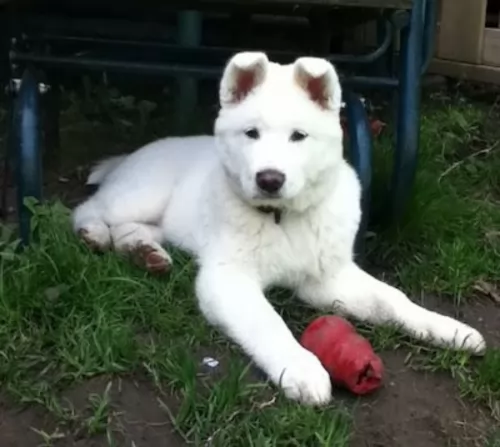 The Pungsan dog is a large dog – a kind of spitz-type dog which stands between 55 and 60cm in height and weighs between 18-24 kg.
The Pungsan dog is a large dog – a kind of spitz-type dog which stands between 55 and 60cm in height and weighs between 18-24 kg.
The dog has a thick whitish coat that even allows them to sleep in the snow. They have a muscular build with a deep chest. The legs are straight and strong, with the typical Spitz-type triangular head with the almond-shaped eyes and erect ears. The tail is high-set, curling over the back. After mating, within 60 – 70 days they can produce 2 to 4 puppies.
It it thought that the Pungsan’s intelligence is due to wolf DNA but there is a question mark over this. They are intelligent dogs though.
These dogs are always loyal and protective of their owners, forming strong bonds with them. They are strong-willed and independent and will require training and socialization if you want them to be obedient, well mannered dogs.
They’re intelligent so won’t have problems learning. When properly trained and socialized, they can be good playmates for children. He is also able to get along well with other animals in the house.
They’re aloof with strangers and have strong territorial instincts, but this just goes towards making them excellent watchdogs.
 For those who live with the American Pit Bull Terrier there is no better dog. The APBT loves people and loves children. They think they are lap dogs, and they certainly are watch dogs. They love their people but their barks at strangers at home are not because they are protecting their people but rather they are greeting the strangers into their home. Unfortunately, they will not greet another dog in the same way. However, when their people are seriously threatened they will give their lives to defend them.
For those who live with the American Pit Bull Terrier there is no better dog. The APBT loves people and loves children. They think they are lap dogs, and they certainly are watch dogs. They love their people but their barks at strangers at home are not because they are protecting their people but rather they are greeting the strangers into their home. Unfortunately, they will not greet another dog in the same way. However, when their people are seriously threatened they will give their lives to defend them.
These are strong, confident dogs who want to please their people. They love children and make great family dogs but require a strong owner and a strong pack leader. The need to be under control around other dogs and because of their strength, need a strong owner. It is their aggression towards other animals that must be controlled.
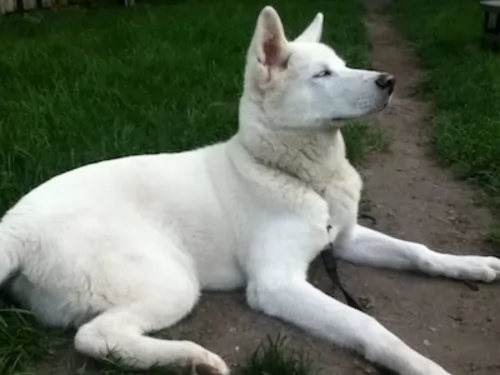 The Pungsan is a wonderful dog if you’re looking for an affectionate, loyal pet.
The Pungsan is a wonderful dog if you’re looking for an affectionate, loyal pet.
These dogs thrive on having an owner that is energetic and a strong leader. It likes to become involved in all the activities the family is involved in, loving to join them on hikes and camping trips. Its a dog that is also protective and territorial and makes a good watchdog too.
With proper training and socialization he gets on well with children and other pets in the home, making him a welcome canine family member for any busy household.
 Though the American Pit Bull Terrier is healthier than most large dogs, they do have an issue with hip dysplasia. Breeders have been working to breed this out of the APBT and their work in this area has helped with the other issues with the patella, heart and thyroid. The APBT can have skin allergies and Demodex Mange. This condition can be either deadly or just a localized skin issue. Immunizations and testing is essential for this breed. When not immunized, American Pit Bull Terrier puppies have a greater incidence of parvovirus than other breeds. They also might have cataracts and congenital heart disease.
Though the American Pit Bull Terrier is healthier than most large dogs, they do have an issue with hip dysplasia. Breeders have been working to breed this out of the APBT and their work in this area has helped with the other issues with the patella, heart and thyroid. The APBT can have skin allergies and Demodex Mange. This condition can be either deadly or just a localized skin issue. Immunizations and testing is essential for this breed. When not immunized, American Pit Bull Terrier puppies have a greater incidence of parvovirus than other breeds. They also might have cataracts and congenital heart disease.
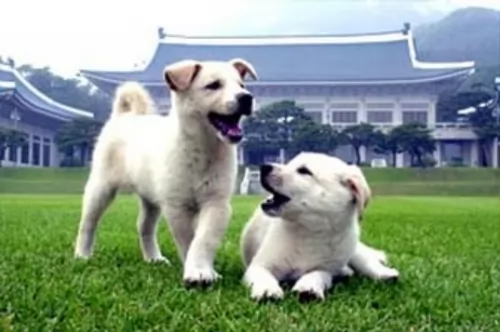 The Pungsan is a healthy breed prone to very few health issues, yet there will always be those common health issues that plague dogs like these. One of these is hip dysplasia, while others are obesity, bloat and cancer.
The Pungsan is a healthy breed prone to very few health issues, yet there will always be those common health issues that plague dogs like these. One of these is hip dysplasia, while others are obesity, bloat and cancer.
It can be very sad when your vet tells you that your dog has hip dysplasia. Fortunately with modern veterinary medicine, a dog can be kept happy with this ailment.
The hip joint doesn’t develop properly and painful wear and tear with arthritis makes it very difficult for the dog to be mobile. It’s a genetic condition but diet and environmental factors play a huge part too. Get your pet to the vet to ensure he is pain free.
Seizures in a dog can be caused usually because of trauma, tumor or infection. Seizures can start from as young as 6 months of age.Some seizures can last for a long time and are considered an emergency, requiring immediate veterinary help.Your veterinarian will want a complete history and perform a neurological exam.
 How you feed your American Pit Bull Terrier puppy is important to her health as an adult and long life. The adult dog should be fed one and a half to two and a half cups of high quality food twice a day. Puppies should be fed more often as they grow. DO not feed your APBT soft or canned dog food. Their food should be dry. Be careful not to feed too much as you do not want an obese American Pit Bull Terrier.
How you feed your American Pit Bull Terrier puppy is important to her health as an adult and long life. The adult dog should be fed one and a half to two and a half cups of high quality food twice a day. Puppies should be fed more often as they grow. DO not feed your APBT soft or canned dog food. Their food should be dry. Be careful not to feed too much as you do not want an obese American Pit Bull Terrier.
As previously mentioned this is a healthy breed with problems with:
These are usually inherited, and the pup may show signs early, or they could be developed later in life. They can be removed.
Hip dysplasia as in many larger, stronger breeds this can be a major problem. Breeds should test for it and APBT breeders are attempting to breed it out of the APBT.
This is a congenital issue that breeders are also breeding against and if they have it your American Bit Bull Terrier was likely born with it.
Many APBT are allergic to grasses or out outside allergens. Shots or medication can deal with these.
This is an athletic, joyful breed that loves to play, love sports and loves any activity that bonds it with its family. Some of the many sports the American Pit Bull Terrier likes to participate in include: agility, obedience competition, weight pulling, lure coursing and fly ball. He also needs backyard exercise and daily walks.
When walking your American Pit Bull Terrier, make sure she is on a leash as the breed has a tendency to be aggressive with other dogs coming into their space. The APBT loves to work. They are good therapy dogs, search and rescue dogs, even service dogs.
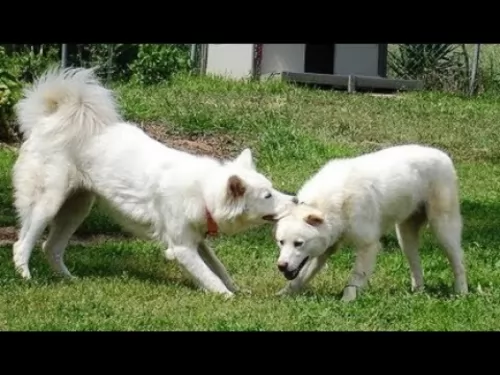 With his dense coat, this dog will require a brush twice a week to keep the fur free from matting and from loose hair. He is after all a fairly heavy shedder and will require this regular brushing to remove the dead hair and maintain the luster and sheen of the coat.
With his dense coat, this dog will require a brush twice a week to keep the fur free from matting and from loose hair. He is after all a fairly heavy shedder and will require this regular brushing to remove the dead hair and maintain the luster and sheen of the coat.
This is a strong, athletic dog and he is mentally sharp as well. He will require vigorous physical- and mental activity each day. He isn’t the kind of dog to lie around for long periods of time as this leads to frustration and destructive behavior and then the owner should be blamed.
Take him on walks or long hikes – he’ll love that – and play ball- and rope games with him. He will be quite game for swimming as well.
Your Pungsan dog can get to 14 years of age with good food. While you do get some excellent commercially manufactured dog foods, you want to be sure your pet gets some nutritious home-made food too.
Make sure that the kibble is the high quality ones with lots of vitamins and minerals. Add in some home-made food twice a week. Boiled chicken, brown rice or pasta and spinach, sweet potatoes and carrots are a healthy choice for your pet. Your dog will do well on plain, simple, nutritious, tasty food like this. Chop this food up and add it into the dry kibble a couple of times a week.
Some raw meat added in from time to time will help his skin and coat remain healthy. Never leave him without a constant source of fresh, cool water.